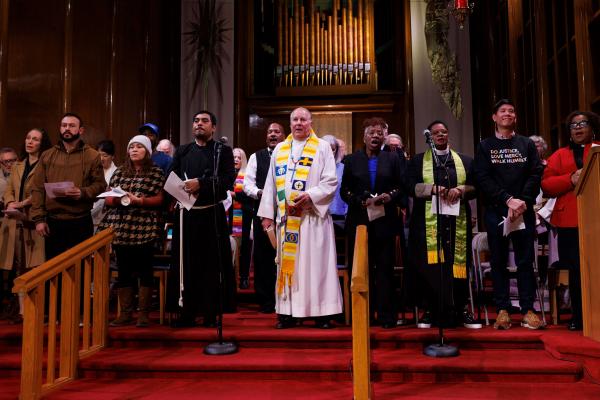My friend Myca pointed out that Encanto doesn't have a villain.
Disney villains are almost as popular as the princesses — they even have their own board game. And the animated movie Encanto, available for streaming on Disney+, would seem ripe for villainy. The magical Madrigal family at the heart of the film begins to lose the magic that made them special — surely someone is to blame! But no one lurks in the shadows, twirling a mustache and absconding with magic. Instead, the story of Encanto is one of families, systems, and prophets — one that can serve as a warning and a balm to churches struggling to cope with a changing world.
In an invigorating opening number, Mirabel introduces us to her family. Led by their abuela, Alma, who came (as an undocumented asylum seeker, it’s implied) to this new land, each person in the family has a magical ability. Mama Julieta heals people with food and Mirabel's sister (Isabela) conjures flowers, for instance. But Mirabel doesn't have a gift. At her ceremony, when each person’s gift is revealed, she receives nothing. What’s wrong with Mirabel?
Spoilers follow
Mirabel begins to notice cracks in the casita, the magical house the Madrigals call home. When she tries to point them out, Alma dismisses her concerns: “There is nothing wrong with la Casa Madrigal. The magic is strong!”
Mirabel sets out to understand what's happening — a quest that leads her to Tio Bruno. Bruno can see snippets of the future, a gift that made him unpopular and drove him into hiding. (One of the film’s catchiest numbers insists they “don't talk about Bruno.”) Bruno confesses that he went into hiding because in a vision, he witnessed the end of the magic and Mirabel was at the center of it.
As she dives into the secret of the magic, Mirabel begins to see the cracks in her family. No matter how much she does, Luisa never feels strong enough. Isabela longs to be more than her beauty. Cousin Dolores longs to be seen — specifically by the man to whom Alma has decided Isabela will be married. And Bruno … well, we don't talk about Bruno.
Mirabel begins to suspect that the magic mirrors the health of the family, and the problem is the family’s health. She raises this concern to Abuela, who snaps, “I don't know why you weren’t given a gift. But it’s not an excuse for you to hurt this family.”
Abuela’s anger is familiar to anyone who’s been part of a toxic group — a family, a business, a church. The more established and successful any system becomes, the harder it is to remain open and responsive to change.
The church in first-century Ephesus faced this exact problem. Confronted by pressures to conform to the surrounding pagan culture, the church had taken a particularly rigid stance against a group of false teachers at work in the region (a stance for which Jesus praises them). However, in their zeal for maintaining their integrity, Jesus warns they’ve made a grave error:
I have this against you, that you have abandoned the love you had at first. Remember then from what you have fallen; repent, and do the works you did at first. If not, I will come to you and remove your lampstand from its place, unless you repent.
-Revelation 2:4-5
The lampstand language is particularly ominous. Jesus introduced himself as the one who walks among the lampstands, which had previously been identified as symbols of the seven churches of the Revelation. In other words, Jesus is warning the Ephesians that while their goal (maintaining their identity as Jesus’ church) is good, the means by which they’re achieving their goal is wrong. They’ve abandoned their first love — Jesus himself — and thereby are dangerously close to losing their identity as a church.
The way the Ephesians are trying to maintain their identity is destroying the very thing the’re trying to preserve.
After Abuela’s abuse of Mirabel destroys the casita, Abuela realizes her sin. She apologizes to Mirabel, saying, “I was given a miracle. And I was so afraid to lose it that I lost sight of who our miracle was for.”
This is Jesus’ charge to the Ephesians: We have been given a miracle — Jesus’ saving work. But far too often, in our zeal for that miracle, we destroy the very thing we’re trying to protect. Case in point is the so-called “deconstruction” movement in the evangelical church. Many young people, like Mirabel, see cracks in the house that raised them and introduced them to Jesus. They point to entrenched patriarchy, white supremacy, partisan politics, and more. But rather than listen to the warnings of these young prophets, those in charge of the house often ignore, shame, belittle, and even excommunicate.
When Abuela realizes that she, not Mirabel, is the source of the fracture, she apologizes. She weeps, lamenting that the family is broken and she, as the head of the family, is responsible.
Mirabel takes her hand and promises, “Nothing will ever be broken that we can’t fix together.”
Abuela recognizes Mirabel is not a threat to the family, but a gift. It is through her perspective and voice that the family can see its flaws honestly. They can turn out and become a balm to their community once again — a balm that doesn’t destroy them as they serve the world.
The church needs our young prophets. Rather than casting them out, we should listen to them, receive their perspective, and ask them to help us change. Perhaps then we too, like Abuela to Mirabel, could say to them, “I asked for a miracle and he sent me you.”
Got something to say about what you're reading? We value your feedback!







